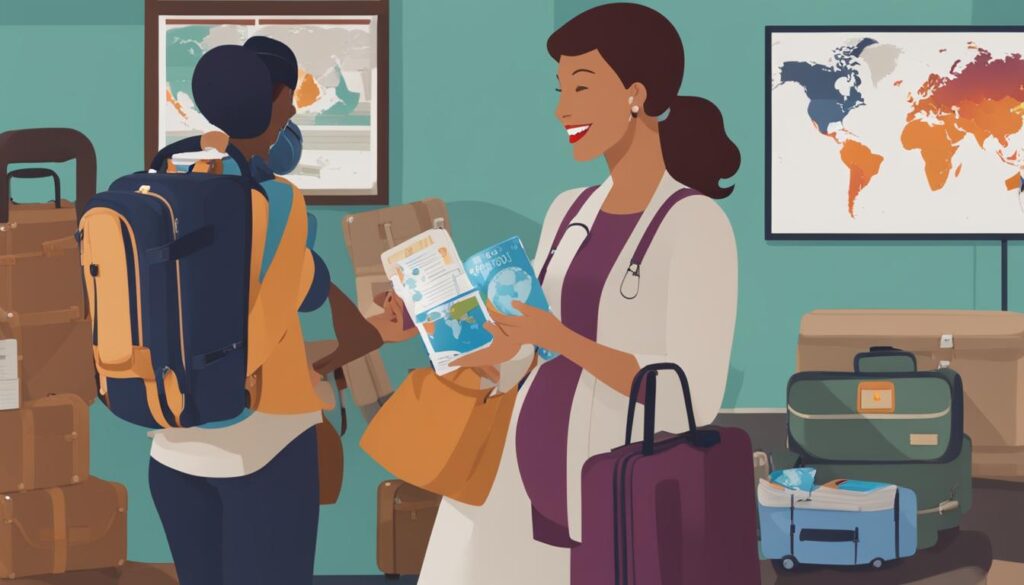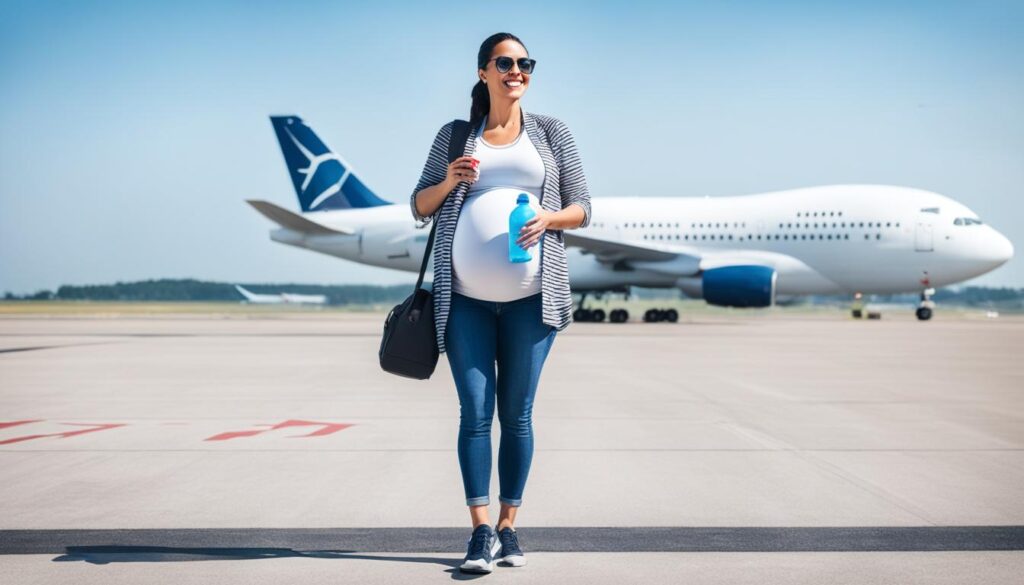Traveling during pregnancy can be a rewarding and memorable experience. However, it’s crucial to prioritize your health and safety while on the go. In this section, we will share essential travel health tips for pregnant women to help ensure a safe and comfortable journey. These tips include everything from choosing the right destination, consulting with your healthcare provider, packing essentials, adopting healthy habits, managing pregnancy discomforts to dealing with emergency situations. We aim to provide you with the information you need to make informed decisions about your travel health, so you can enjoy your trip with peace of mind.
To get started, let’s take a look at some of the best practices for traveling safely during pregnancy. By following these tips, you can minimize risks and enjoy your journey to the fullest.
Prenatal Travel Tips
Traveling while pregnant can be an exciting experience, but it’s important to take necessary precautions to ensure the safety and wellbeing of both you and your unborn baby. Here are some key prenatal travel tips to help you have a comfortable and enjoyable journey:
- Consult with your healthcare provider before booking any travel and ask for medical clearance
- Avoid traveling during the first and last trimesters when possible, as they pose higher risks
- Choose destinations and activities that are safe and suitable for pregnant women
- Pack essentials such as comfortable clothing, snacks, and any necessary medical documents
- Stay hydrated and eat nutritious meals during your journey
- Consider investing in compression stockings to reduce the risk of blood clots during long flights or car rides
- Take frequent breaks to stretch your legs and avoid sitting for long periods
- Choose transportation options that offer comfortable seating and take necessary precautions, such as wearing seat belts during car rides
- Keep a list of local healthcare facilities and emergency numbers, just in case
By following these best practices for pregnant travelers, you can manage your pregnancy comfortably and have a safe and enjoyable journey. Remember, always consult with your healthcare provider for individualized guidance and advice.
Choosing Your Destination
Choosing the right destination is crucial for ensuring a safe and healthy trip during pregnancy. Consider the following factors when making your travel plans:
| Consideration | Things to look for |
|---|---|
| Healthcare facilities | Look for destinations with quality medical care, including access to prenatal care if needed. |
| Local diseases | Be aware of common diseases in the area and take necessary precautions, such as getting vaccinated or avoiding insect bites. |
| Accessibility | Choose a destination with easy access to transportation, accommodation, and other essential facilities. Avoid destinations with strenuous activities or long travel times, which can be challenging during pregnancy. |
It’s also essential to check travel advisories and restrictions for your chosen destination. Some areas may be unsafe for pregnant travelers due to political unrest or natural disasters.
Remember to consult with your healthcare provider before finalizing your travel plans. Your provider can offer valuable advice on managing your pregnancy while traveling and recommend any necessary precautions.
Consultation with Your Healthcare Provider
When embarking on a trip while pregnant, it is crucial to consult with your healthcare provider. They can give you personalized advice based on your pregnancy and medical history, and clear you for travel. You should also discuss:
- Your destination: whether it poses any specific risks or requires additional precautions.
- Your itinerary: modes of transport, the duration of the trip, and any specific activities planned.
- Your medical kit: what medications you should carry with you, what to do in case of emergency and how to get hold of medical help while away.
- Any specific health requirements: diet, hydration, and exercise routines.
Medical clearance also serves as an assurance to airlines, hotels, and other service providers, allowing you to travel more safely and confidently.
Packing Essentials
Traveling during pregnancy can be stressful, but packing the right essentials can help ease your worries. Here are some must-have items for a healthy and comfortable journey:
| Item | Description |
|---|---|
| Comfortable clothes | Loose-fitting, breathable clothes that accommodate your growing belly and provide ease of movement. Consider compression socks to prevent swelling in your legs. |
| Snacks | Healthy snacks like fruits, nuts, and granola bars can help keep nausea at bay and provide the necessary nutrition for you and your baby. Don’t forget to drink plenty of water! |
| Prenatal vitamins | Make sure to pack enough of your daily vitamins and supplements. It’s also a good idea to keep a copy of your medical records in case of emergencies. |
| Medical documents | Carry a copy of your doctor’s notes that confirm your due date and any necessary precautions you should take while traveling. You may also need to bring along a letter from your healthcare provider allowing you to fly during pregnancy. |
Remember, staying healthy while traveling during pregnancy requires careful planning and preparation. Pack these essential items and enjoy a safe and comfortable journey.
Healthy Habits on the Go
As a pregnant traveler, it is crucial to maintain healthy habits while on the go. Here are some tips that can help you stay healthy and comfortable during your journey:
- Stay Hydrated: Be sure to drink enough water to stay hydrated throughout your trip. It is recommended that pregnant women drink at least eight glasses of water a day. Carry a refillable water bottle with you to make it easier to stay hydrated.
- Eat Nutritious Meals: Eating balanced and nutritious meals can help you stay energized and keep your baby healthy. Pack healthy snacks, such as fruit, nuts, and granola bars, to ensure you always have a nutritious snack on hand.
- Get Enough Rest: Rest is essential during pregnancy, especially when traveling. Be sure to prioritize rest and plan for regular breaks. If traveling by car, plan to stop every hour or two to stretch your legs and take a break.
- Avoid Stress: Traveling can be stressful, but it’s important to avoid unnecessary stress during pregnancy. Plan ahead to avoid situations that could cause anxiety or stress, such as rushing to catch a flight or worrying about losing your luggage.
| Tip | Description |
|---|---|
| Carry Ginger Candy | Ginger candy can help ease nausea during pregnancy. Keep a pack with you to help alleviate any morning sickness or motion sickness while traveling. |
By following these tips, you can stay healthy and comfortable while traveling during pregnancy. Remember to prioritize your wellbeing and take things at your own pace. Safe travels!
Safe Transportation Choices
During pregnancy, traveling requires extra care and attention. Choosing the right transportation mode is essential to ensure a safe journey for you and your baby. Here are the most suitable options for pregnant travelers:
| Mode of Transportation | Precautions |
|---|---|
| Consult your doctor before booking tickets, wear comfortable clothing and shoes, drink plenty of water, and walk around the cabin every hour during the flight. | |
| Road Trips | Wear seat belts, take frequent breaks to stretch your legs and use restroom facilities, and pack healthy snacks to avoid stops at fast-food restaurants. |
| Train Journeys | Choose comfortable seating options, pack healthy snacks and plenty of water, and take short walks through the train as needed. |
It is advisable to avoid any transportation mode that could expose you to excessive heat, radiation, or motion sickness. Consult with your healthcare provider before making any travel plans to ensure the safety of both you and your baby.
Managing Pregnancy Discomforts
During pregnancy, your body undergoes many changes that can cause discomfort. While traveling, these discomforts can increase due to changes in your routine and environment. However, with proper planning and preparation, you can manage these discomforts and enjoy your travels.
One of the most common discomforts during pregnancy is nausea. To manage this, try eating small, frequent meals instead of three large ones. Avoid foods that are high in fat, spicy, or acidic. Ginger, peppermint, and crackers can also help alleviate nausea.
Fatigue is another common complaint during pregnancy. To combat this, make sure to get plenty of rest and avoid overexerting yourself. Take naps when you need them, and be sure to sit down and take breaks during activities that require standing for long periods.
Back pain is a frequent discomfort, especially during later stages of pregnancy. Try to avoid heavy lifting and wear comfortable, supportive shoes. Use pillows to support your back while sitting or sleeping, and practice good posture.
Other potential discomforts during pregnancy include headaches, constipation, and swollen feet. Speak with your healthcare provider before your trip to discuss any specific discomforts you may experience and get their recommendations for managing them while traveling.
Remember to stay hydrated by drinking water regularly throughout your journey. Pack comfortable clothing and shoes, and consider bringing a pregnancy pillow for added support. By taking care of yourself and managing pregnancy discomforts, you can have a safe and comfortable travel experience.
Traveling during Different Trimesters
Traveling during pregnancy can be a safe and fulfilling experience with proper precautions. As you progress through each trimester, there are specific considerations you should be aware of to ensure your safety and wellbeing, as well as that of your unborn baby.
First Trimester
During the first trimester, you may experience symptoms such as nausea, fatigue, and dizziness. It is important to take frequent breaks and stay well-hydrated. Avoid traveling to areas with a high risk of contagious illnesses or disease outbreaks, as your immune system is weaker during this time. Consult with your healthcare provider before taking any medication or vaccines.
Second Trimester
The second trimester is generally considered the most comfortable time to travel. However, you should still take precautions such as wearing comfortable clothing and footwear, drinking plenty of water, and moving around frequently to prevent blood clots. Avoid traveling to areas with limited healthcare facilities and check with your healthcare provider before taking any long flights.
Third Trimester
During the third trimester, you may experience more discomfort and fatigue. It is recommended to avoid traveling long distances or to areas with limited medical facilities. Check with your healthcare provider before traveling, as some airlines may restrict travel during the later stages of pregnancy. Pack all necessary medical documents, such as your prenatal record and medical clearance from your doctor.
Always prioritize your safety and comfort when making travel plans during pregnancy. By taking proper precautions and consulting with your healthcare provider, you can enjoy a safe and memorable journey for you and your unborn baby.
Dealing with Emergency Situations
Traveling during pregnancy requires excellent planning, but even the best-laid plans can go awry. That’s why it’s crucial to know how to handle emergency situations while on the road.
First and foremost, make sure you know the local emergency numbers and have them saved on your phone in case of urgent situations. If you need immediate medical assistance, don’t hesitate to call for help.
Secondly, having travel insurance that covers medical expenses is essential since healthcare costs can be costly abroad. Make sure to purchase comprehensive travel insurance that covers pregnancy-related complications to avoid any financial burdens in case of emergencies.
If you experience any pregnancy-related complications, seek medical attention immediately. This is especially important if you’re traveling in a region with limited access to medical facilities. Consult with your healthcare provider regarding the actions you should take in specific scenarios to be well-prepared.
Remember to be proactive when it comes to your health to ensure a safe and healthy pregnancy while traveling.
Cultural Considerations
As a pregnant traveler, it’s essential to be aware of cultural differences and customs to make your journey safe and comfortable. The cultural norms and practices may differ significantly from what you are accustomed to, affecting your pregnancy management while traveling.
While planning your travels, research your destination’s customs and beliefs to ensure you respect local cultures. Here are some essential tips to keep in mind:
- Be mindful of dress codes when visiting religious places or conservative areas.
- Respect the local customs of food, such as avoiding street food or undercooked meat.
- Be aware of the local customs related to pregnancy, such as modesty practices for pregnant women or beliefs around pregnancy and childbirth.
- During long flights, adjust your meal preferences and notify the airline staff of your pregnancy to receive special services.
By understanding and respecting the cultural practices of your destination, you can navigate your travels comfortably while ensuring your health and wellbeing. Remember to consult with your healthcare provider before embarking on any travel during pregnancy.
Conclusion
In conclusion, traveling during pregnancy can be a safe and enjoyable experience with proper planning and preparation. By following the travel health tips for pregnant women outlined in this article, you can prioritize your wellbeing and that of your unborn baby. Remember to consult with your healthcare provider before traveling, pack essential items, maintain healthy habits, and be aware of emergency situations and cultural differences.
Always keep in mind pregnancy and travel health, as well as the need to manage pregnancy while traveling. With the right precautions, you can take advantage of pregnancy and enjoy a memorable trip. Safe travels!

















































